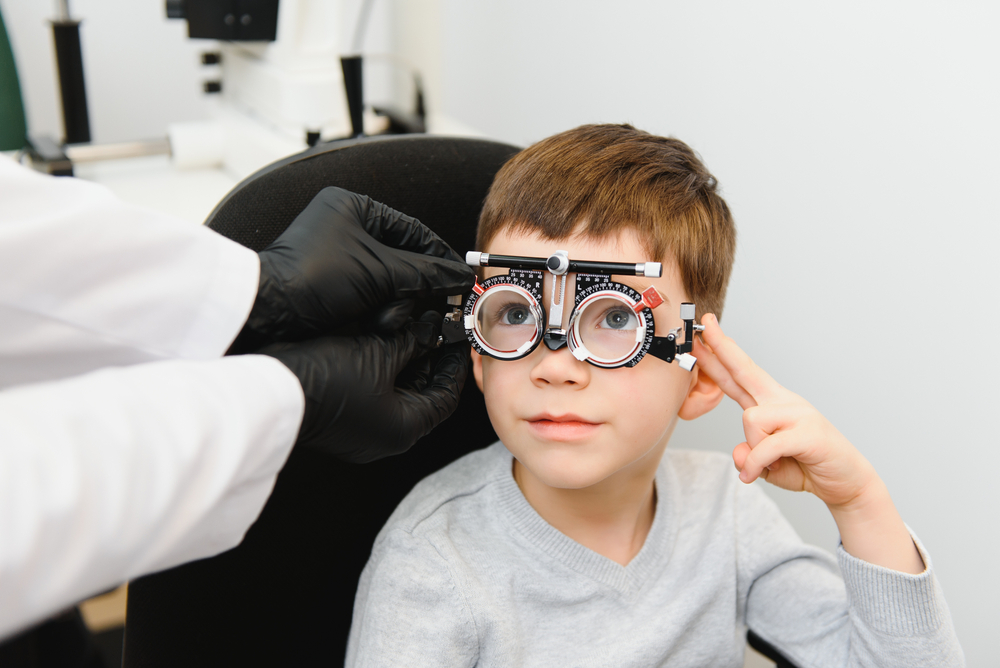The Importance of Pediatric Eye Care: Ensuring Your Child’s Visual Future
Blog:The Importance of Pediatric Eye Care: Ensuring Your Child’s Visual Future

The Importance of Pediatric Eye Care: Ensuring Your Child’s Visual Future
Vision plays a critical role in a child’s development, learning, and overall well-being, yet many kids don’t receive comprehensive eye exams until a problem becomes noticeable. By then, they may already be struggling in school, experiencing headaches, or missing out on the details of the world around them.
Why Early Eye Exams Matter
Children’s eyes develop rapidly in the first few years of life. While newborns have blurry vision at birth, they quickly begin tracking movement, recognizing faces, and exploring their environment visually. However, some eye conditions—like amblyopia (lazy eye), strabismus (eye misalignment), or significant refractive errors—may not be obvious to parents or even pediatricians during routine checkups.
A comprehensive pediatric eye exam goes beyond the standard vision screenings conducted at school or the pediatrician’s office. These screenings are helpful but limited—they might detect nearsightedness or severe vision problems, but they won’t catch subtle issues like eye coordination problems, focusing difficulties, or early signs of disease.
The American Optometric Association recommends that children have their first eye exam around age three, and again before starting school. From there, annual exams ensure their vision keeps up with their growth.
The Link Between Vision and Learning
It’s no secret that children rely on their eyesight for learning. In fact, nearly 80% of classroom learning is visual—whether it’s reading books, looking at the board, or following along with digital screens. If a child has trouble seeing clearly, they may struggle with reading comprehension, become easily fatigued, or even avoid certain activities altogether.
Many parents assume that if their child isn’t complaining about their vision, there’s no issue. But kids don’t always realize they have a vision problem. To them, the way they see the world is normal—even if that means words are blurry, images are double, or they can’t focus for long periods.
Some common signs of vision issues in children include:
• Frequent squinting or covering one eye
• Complaints of headaches or tired eyes
• Holding books or screens too close
• Difficulty paying attention or a short attention span
• Poor handwriting or struggles with hand-eye coordination
If any of these sound familiar, it’s time for an eye exam.
Setting the Foundation for Lifelong Eye Health
Establishing good eye care habits early on sets the stage for a lifetime of healthy vision. Not only do pediatric eye exams detect issues that can be corrected more effectively when caught early, but they also create a baseline for monitoring changes as a child grows.
Additionally, as children become more immersed in digital devices, the importance of regular eye exams has only increased. Excessive screen time can contribute to digital eye strain, nearsightedness progression, and focusing difficulties—things an optometrist can help manage.
Take the Next Step for Your Child’s Vision
Your child’s eyesight is too important to leave to chance. We offer comprehensive exams tailored to children’s unique visual needs. Whether it’s their first eye exam or they need a check-up before heading back to school, we’re here to ensure their vision is clear, comfortable, and set up for success.
Schedule your child’s eye exam with RayEye Vision Care, and give your child the gift of healthy eyesight for years to come. Contact our office in Leander, Texas, or visit our website to book an appointment today.


